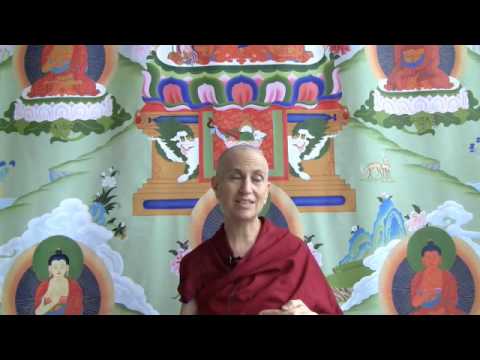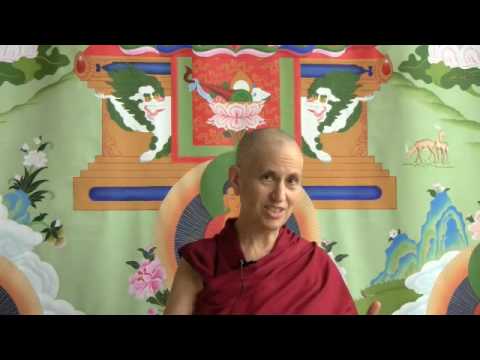Clairvoyant powers
Part of a series of Bodhisattva's Breakfast Corner talks given during the Green Tara Winter Retreat from December 2009 to March 2010.
- Clairvoyant powers are not the purpose of the path
- Buddha discouraged display of any powers so people stay focused on the path
Green Tara Retreat 029: Clairvoyant powers (download)
Somebody said that they’d been doing the lamrim meditations and in the practice of the far-reaching ethical conduct, there’s a point that seems very strange to them. Where it says that if one has clairvoyant powers then to prove the validity of the Dharma, if all other methods fail, or to stop other’s negative actions, then you should use these clairvoyant powers to do that. They’re asking please to explain this.
The idea is that normally the Buddha said to his disciples that they should not display whatever clairvoyant powers they had. The reason for this is that people would get superstitious and think that these clairvoyant powers were the purpose of the path. They are not. Even if you get these clairvoyant powers just with concentration, you don’t have to have renunciation, wisdom, bodhicitta, none of those things. They would think that worldly people could have these powers.
The Buddha didn’t want people to start thinking these powers were the end-all of the path. Also, people would then get very strange and kind of “gaga-eyed” over people who had these powers. There might be other people who are even better practitioners who don’t have those powers, that then the people would ignore instead of listening to their teachings. It was the Buddha’s way to help people really stay focused on what the path is, and on liberation, not just miraculous things. Then he said that they couldn’t display their clairvoyant powers except in a situation where they could see, through their clairvoyant powers, that this was the only way to convince some people about the validity of the Dharma. It was the only way to prevent some people from doing very negative actions. In those cases, they were allowed to use their powers.
You have a situation even from the Buddha’s own life. We celebrate this. It’s in the lunar calendar in the first month of the full moon day, and it’s called the Day of Miracles. The story behind it is that there were some non-Buddhist ascetics, who had all these miraculous powers, who kept on challenging the Buddha to a contest of miraculous powers. The Buddha kept on saying, “Just forget it, you guys.” He didn’t even want to get involved in any of this. But they kept hammering and hammering and saying, “Oh, you just don’t have any powers. That’s why you don’t want to do it.” In the way of how kids taunt each other on the playground: “You’re a coward.” Finally the Buddha said, “Okay, we’ll do it.” They had the contest of powers and of course the Buddha’s miraculous powers outshone those of the non-Buddhists—and for that reason they converted and became the Buddha’s disciples. You can see that for this purpose that [contest] was the only way to get through to those people.
There is another story. I’m not sure if it’s this one, or if it relates to some other story where somebody challenged somebody to a feat of miraculous powers. The Buddha kept on saying, “No, no, no, no, no … ” Finally the non-Buddhist insisted—and so, when they went to have the contest, the non-Buddhist couldn’t get off his chair to go the place of the contest because the Buddhist practitioner was using his powers to keep him seated.
The main point here is you do what is best for others. Normally it’s to keep these things within oneself; and if you do use them not make a big deal about them with other people. Otherwise people can get quite distracted from what is important on the path.
Along this same line, I have one friend who says, “Well, if all of our lamas are so highly realized, why don’t they show their clairvoyant powers to convince the rest of us. Then we’ll have more faith in the Dharma.” And I said to him, “Well, if they do that, then you’ll just sit there and go, ‘Wow, show me more!’” You won’t want to practice the Dharma because you’ll be so entranced with something that seems kind of exotic.
Venerable Thubten Chodron
Venerable Chodron emphasizes the practical application of Buddha’s teachings in our daily lives and is especially skilled at explaining them in ways easily understood and practiced by Westerners. She is well known for her warm, humorous, and lucid teachings. She was ordained as a Buddhist nun in 1977 by Kyabje Ling Rinpoche in Dharamsala, India, and in 1986 she received bhikshuni (full) ordination in Taiwan. Read her full bio.


